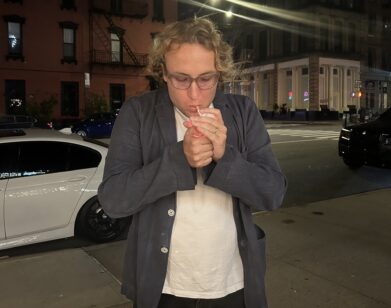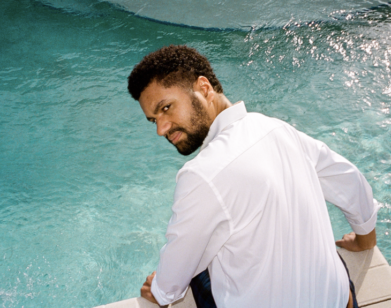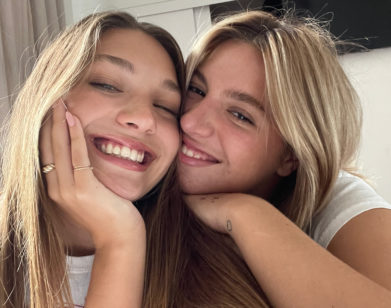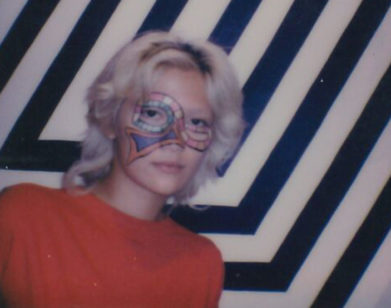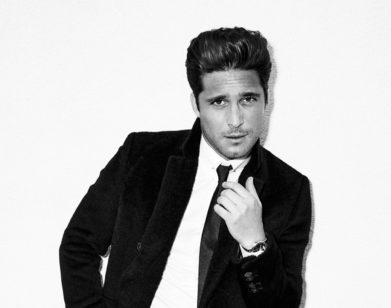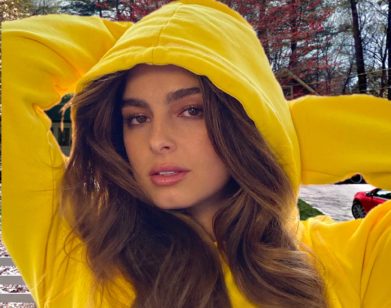Filmmaking Duo Olmo Schnabel and Grear Patterson Think Gen Z Deserves Better
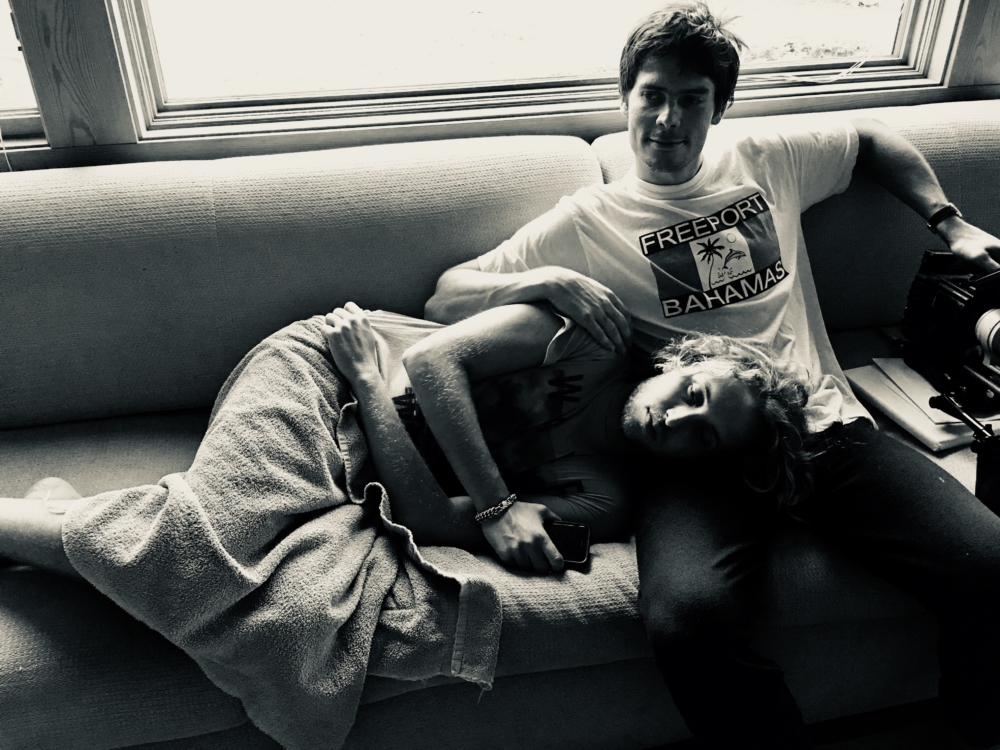
Olmo Schnabel and Grear Patterson. Photo courtesy of Olmo Schnabel.
Giants Being Lonely, the debut feature film directed by Grear Patterson and produced by Olmo Schnabel, appears, at first blush, to be yet another coming of age film about high schoolers balancing sex, love, family, and loneliness (also, baseball). But what occurs over the course the film’s 80-odd minutes involves so much more, including (but not limited to): extended walks through the sanctuary of nature, the search for purpose in a chaotic world, all that’s found along the path for love and acceptance, and all that’s lost—but try putting that on IMDb. Giants Being Lonely marks many firsts for the filmmaking duo: it’s Patterson’s first feature film as a director (who now adds that title to his resumé alongside painter, sculptor, and photographer–one who’s shown in London, Vienna, and New York, to name few), Schnabel’s first as a producer, and the first film to come from their production company, ROD3O, which they hope to use to spotlight honest stories centered around Gen Z. Giants Being Lonely makes its world debut at the 76th Venice Film Festival this Sunday, and is the only American film in the Horizons Competition, which highlights new trends and figures in international filmmaking. Ahead of its premiere, Interview caught up with the pair to discuss the genesis of the film, why they think the current portrayals of Gen Z onscreen are especially convoluted, and how they plan to change them.
———
MARK BURGER: I went in sort of blind–I read the blurb of the film online, and I knew that it was something to do with baseball and summer and high school. But I was completely unprepared for the film. And what a way to end it! It was very unexpected.
OLMO SCHNABEL: I think that even though the movie has a darkness to it, and the characters are dealing with issues of abandonment and loneliness–these tough, profound human issues—it’s based on a true story. Grear, when he was in high school, was the first person to find out about what happened. It’s definitely a controversial decision, but I think it’s also kind of a signature. I think it closes it out in a way where people at least know what happened, where maybe at moments you don’t know what’s happening. You don’t know why he’s on the verge of a nervous breakdown when his dad’s talking to him in the shed. So I think at the end, after not showing anything, we thought it would be important to show everybody.
BURGER: Were there any specific paintings, films, or any other media that you were looking to while you were making the film?
GREAR PATTERSON: We didn’t watch any movies while we were making the film, but we watched Fat City and Elephant together a lot.
SCHNABEL: Barry Lyndon, Stand By Me, Badlands. Before the movie, we watched this kind of stuff, then afterwards, we didn’t want to be as affected. At the beginning, the Hudson River Valley School was something that Grear and I spoke about, because we thought it was really interesting to think about this character in nature, and having nature be this sanctuary. That’s why we have Bobby (Jack Irving) running around in the woods. When we went into the edit, we really cut down on a lot of stuff–we could’ve made a whole movie about this kid just walking around in the woods. When we went to North Carolina, we got there 15 days earlier with just him, and we were just driving around Hillsborough, Chapel Hill, all over North Carolina, just running around the woods and filming nature. He was just able to integrate into the landscape. He felt very comfortable in that world rather quickly.
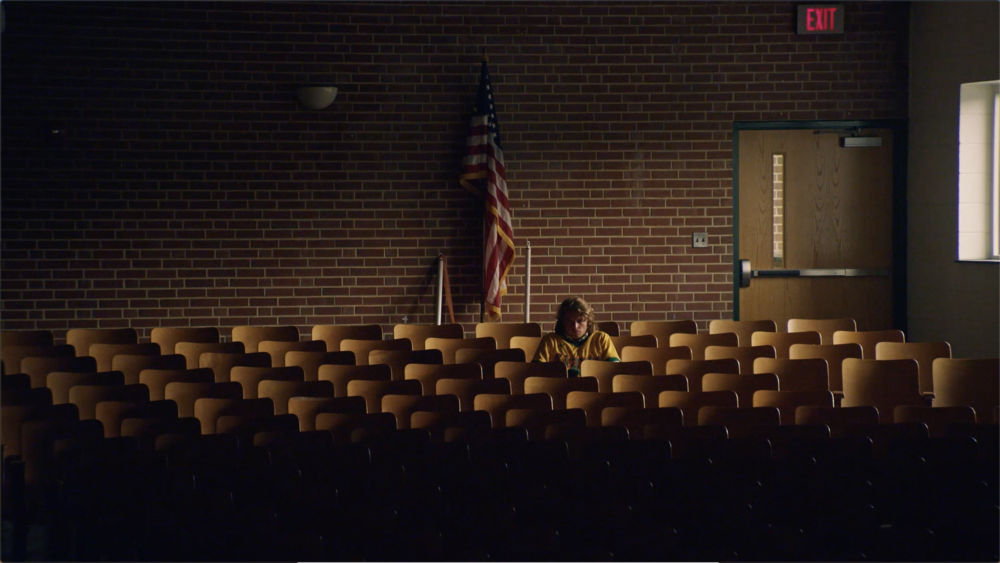
Ben Irving in Giants Being Lonely.
BURGER: What was the intention behind choosing not to have a strictly defined narrative?
PATTERSON: I think we really wanted to make it so that the story would be relevant to as many people as possible. So by leaving the key information out, the viewer was able to connect with it, and generate a little bit of their own story. It made it so it was unique to each individual.
SCHNABEL: The movie is a feeling, it’s a state of mind, and that’s what we try to evoke. It’s what it feels to be at that moment in your life. What it feels to be in your head–to be on a team, or be surrounded by your friends, but you truly feel alone. These are feelings that we think are pretty universal. When you hear “coming of age” or “baseball” you think, “Okay, America, kids.” But I think the movie lends itself to a wider audience. That’s what I think is beautiful about the movie–there’s an openness to it, and I think that makes it more intimate and relatable.
Both Grear and I put a lot of our own, personal feelings into it. Jack, Ben, and Lily have been our best friends for a long time. Jack and Ben, the two main actors, are brothers, and they’ve been my best friends since I was eleven. The movie is based on feelings, and instead of telling people about feelings, it was more about an impression. When you see movies about kids these days, everything is so over-expository and vulgar. I don’t believe in that. I believe that kids are sensitive. And with Adam (Ben Irving), at the end of the movie, I don’t think he comes off as being this evil criminal. I think he’s a victim to his life circumstances, and he couldn’t make it. He got pushed to the edge. This is something that’s happening around us, and it’s an issue we’d definitely like to have an open conversation about.
PATTERSON: Even though it has these kind of dark qualities, we still want it to be positive. Allowing people to know that they’re not alone, and that these things happen, and that life is tough for everyone. Bobby, he doesn’t have anything, but he still has love in his life.
SCHNABEL: Bobby survives because, even though his dad’s an alcoholic and he’s completely couch-ridden, he tells him he loves him. So he may be absent, but at the end of the day, Bobby is motivated by love. It’s a sad reality how, at that age, everything is so small–school, and the girls you date, your friends, feeling insecure. It’s a volatile time. We wanted to be sensitive to our subjects, and not have them on cell phones the whole time and not have them cursing. I think the kids actually get a bad rep. We wanted to show the beauty in adolescence. The world that we portrayed was a world that we loved. It’s a world that doesn’t exist anymore. We strayed away from the strip mall, we strayed away from a hyper-realistic portrait of America, and opted towards this fantastical world of the South, but we also wanted the world that we portrayed to be international. That’s why we don’t even mention in the movie that it’s in Hillsborough, North Carolina. Grear and I, we set out to do something, and we made a promise to each other, and we went there kind of like The Little Engine that Could.
PATTERSON: Yeah, The Little Engine that Could. “I think I can, I think I can.”
SCHNABEL: We were like, “Yes, yes, yes, this is possible,” and look at it now–it’s the only American movie in the Orizzonti Competition. I think it’s important to tell stories like this about America, because even though it’s not political, we see a beauty in a place where, now with this whole political situation, and even though this movie has ugliness in it, there might be more love in this than the political climate in America right now. Creating this little world that isn’t America, but it is America, was very fun.
PATTERSON: It’s honest, and I think we really try our best to respect our viewers. We’re never trying to assume that they know or they don’t know anything. It’s really just trying to deliver them the information in the most graceful and efficient as possible way.
SCHNABEL: While leaving them space to come to their own conclusions.
PATTERSON: Exactly.
SCHNABEL: It doesn’t tell you what to feel, but it makes you feel something. That is something we’d like to continue to do with the work we’re moving forward with. This is just the first piece to a body of work. ROD3O, our production company, is focused on making what we consider quality content for Generation Z, with its umbrella of independent cinema and art house films. It’s a dying sub genre, I think, and we’d like to bring it back, contextualize it, and teach people about it.
PATTERSON: Hopefully, it’ll help people.
BURGER: Do you think there’s a lack in film, television, or otherwise, that’s portraying Gen Z, but sort of from an unfair viewpoint?
SCHNABEL: One hundred percent. I think that the portrayal of the youth and adolescence is a little bit convoluted and skewed. What I see, what I hear, technology, social media–all of these things stray away from actually talking about feelings and the self. We want to bring it back to things that have been talked about forever. We’re not reinventing the wheel here, but I think we want to respect young people, and show people it’s okay to be sensitive and vulnerable. These are things that actually enable creativity and art-making. We’ve shown the film to kids, and it’s funny because it speaks to them, but they don’t know the way it’s speaking to them. They’re like, “Wow, this is questioning me, and it’s confronting me, but it’s okay. It’s not making me uncomfortable. It’s thought-provoking.”
PATTERSON: It sounds really cheesy, but I remember I would always say, “What we want to do is make them the most appetizing, best meal ever, but we don’t want to chew their food for them.” We just wanted to put it in front of them, give them all the necessary ingredients, then the ball is in their court and they’re going to figure out all the parts that mean something to them.
BURGER: Have you ever been to Venice before?
PATTERSON: Olmo has, I have not been.
SCHNABEL: I’ve been several times with my father. My dad has shown some of his films there. It’s funny–a year ago, when we were speaking about the movie, when we finished the production, Grear was like, “What are we going to do?” And I was like, “A year from now, we’re going to Venice with the movie.”
BURGER: You spoke it into existence.
SCHNABEL: It was nice to do it our way, and I think that’s something people should know. There’s not one way to do something. We feel blessed to be able to have this stage to show to the world and also to go out and do something with all your friends. Everyone knew each other and there was a level a trust. Everyone went there to make this film, not for their own self–I don’t think anyone went there with any type of selfish motivation. It takes a village. We’re just trying to put young people together and trying to go forward, and to see if it works. We’re ready.

